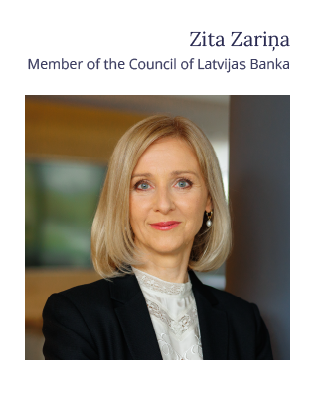Digital euro project
Latvijas Banka continues to play an active role in the digital euro project, carried out by the ECB in cooperation with the national central banks of the euro area. The first part of the digital euro's preparation phase continued to progress throughout 2024. This phase, set to run until autumn 2025, is dedicated to ensuring that the Eurosystem is fully equipped for the introduction of the digital euro in practice, subject to a decision by the Governing Council.
 Discussions around the necessity of a digital euro have gained significant momentum, particularly in light of recent geopolitical developments that exposed deficiencies in the euro area's strategic autonomy in digital payments. The euro area's dependence on a limited number of non-European companies for card payments has emerged as a pressing issue requiring an urgent and practical solution. With over half of the euro area Member States lacking national card payment schemes – and no existing scheme poised to expand across the euro area in the near future – the digital euro stands out as a clear and logical solution. In practical terms, the introduction of the digital euro would empower every resident of the euro area with a straightforward alternative for digital payments, while stimulating competition within the digital payments market.
Discussions around the necessity of a digital euro have gained significant momentum, particularly in light of recent geopolitical developments that exposed deficiencies in the euro area's strategic autonomy in digital payments. The euro area's dependence on a limited number of non-European companies for card payments has emerged as a pressing issue requiring an urgent and practical solution. With over half of the euro area Member States lacking national card payment schemes – and no existing scheme poised to expand across the euro area in the near future – the digital euro stands out as a clear and logical solution. In practical terms, the introduction of the digital euro would empower every resident of the euro area with a straightforward alternative for digital payments, while stimulating competition within the digital payments market.
Latvijas Banka engaged Latvian companies and institutions in the digital euro project, ensuring they were well-informed about the project's progress. In September 2024, Latvijas Banka established the Latvian National Digital Euro Forum, aimed at facilitating dialogue among stakeholders and collecting feedback on the digital euro proposal. This Forum brings together participants from Latvia's financial sector, traders, public interest representatives, and public institutions. The Forum will also continue its activities throughout 2025, convening quarterly at a minimum.
In order to enhance public understanding and awareness of the rationale and progress of the digital euro project, Latvijas Banka issued several publications in 2024, as well as provided interviews and expert commentaries to various media. In 2024, Latvijas Banka also visited several universities in Latvia, introducing students to the digital euro project.
EKS operation
In 2024, the EKS, established and maintained by Latvijas Banka, continued to ensure the execution of euro payments by customers of banks operating in Latvia from an account in one bank to an account in another bank, using the instant payment service and clearing service throughout the Single Euro Payments Area (SEPA). The instant payment service guarantees the execution of transactions within seconds, operating 24/7. Meanwhile, the clearing service processes payments on business days, ensuring that funds are transferred to the recipient within a few hours.
The EKS comprised the following direct participants: nine credit institutions, the Treasury, and Latvijas Banka. At the end of 2024, all members of the EKS were utilising both the clearing service and instant payment service.
Chart 1. Volume and value of payments processed in the EKS in 2024
126.3 million SEPA credit transfers totalling 202 billion euro were executed in the EKS (in the instant payment service and clearing service combined). The volume and value of the payments executed in the EKS grew by 5.0% and 4.3% respectively compared to 2023.
Throughout the year, the volume of instant payments processed via the instant payment service increased 1.4 times. A total of 72.4 million instant payments in the amount of 33.2 billion euro were processed, processing up to 400 000 instant payments a day. The availability of the instant payment service was 100%.
The EKS clearing service, the availability of which was 99.96% in 2024, processed an average of 210 000 customer SEPA credit transfers in the amount of 660 million euro per day. A total of 53.9 million payments were processed, amounting to 168.9 billion euro.
In 2024, Latvijas Banka made preparations to enable payment institutions and electronic money institutions to join the EKS.
Proxy Registry Instant Links
Latvijas Banka continued to ensure the operation of the Proxy Registry Instant Links, enabling the customers of several Latvian and Estonian banks to execute instant payments and other transactions with greater convenience by simply entering the payee's mobile phone number in the payment order.
At the end of 2024, a total of 906 000 instant links had been registered with the Proxy Registry Instant Links (100% availability), representing an 11% increase compared to the end of 2023. During the year, 17.6 million requests were processed by the Registry. 59% of instant links were registered for customers of Latvian banks and 41% – for those of Estonian banks.
TARGET-Latvija operation
In 2024, Latvijas Banka continued to ensure the operation of TARGET-Latvija, which is a component system of TARGET, the third largest payment system in the world.
Chart 2. Volume and value of payments executed in TARGET-Latvija in 2024
The availability of TARGET, including that of TARGET-Latvija, was 99.97% in 2024. Similarly to 2023, TARGET-Latvija processed an average of 627 payments daily, totalling 1.3 billion euro.
Latvijas Banka also provided payment services in euro to institutions with settlement accounts opened with Latvijas Banka outside of Latvijas Banka's payment system TARGET-Latvija, i.e. the Treasury, Latvian, foreign, and international financial institutions. In 2024, payments of such institutions executed by Latvijas Banka amounted to 1.3 billion euro.
Oversight of the payment systems
In 2024, Latvijas Banka performed day-to-day oversight of the EKS, analysing the system's technical and operational functions, compiling statistical data on the EKS, ensuring that the interbank payment environment in Latvia is secure and efficient.
Latvijas Banka regularly compiled and analysed payment data on a semi-annual basis regarding payments made by customers of Latvia's payment service providers, enabling it to oversee the evolution of payment instruments used in Latvia. Payment data were compiled in compliance with a uniform ECB statistical methodology.
Oversight of financial instrument settlement systems
In 2024, Latvijas Banka, in cooperation with the central banks of Estonia, Lithuania, and Iceland, assessed how the depository Nasdaq CSD SE implemented the recommendations from the CROE (Cyber Resilience Oversight Expectations) assessment and addressed the observations provided. By the end of 2024, the depository had implemented all previously unaddressed recommendations, thereby enhancing its cyber resilience capacity in areas where improvements were feasible. According to the assessment, the depository meets the CROE standards at an advancing level (CROE defines three levels of compliance: evolving, advancing, and innovating).
Representing the Eurosystem as the central bank of issue of the euro, Latvijas Banka assessed whether Nasdaq CSD SE complies with the new Eurosystem requirements and verified its continued adherence to the eligibility criteria for depositaries and their links.
Latvijas Banka participated in the work of the Supervisory Council of Nasdaq CSD SE, providing a supervisory perspective on the settlement efficiency, cyber resilience, and operational functioning of the systems operated by Nasdaq CSD SE. Additionally, Latvijas Banka expressed a preliminary view on the settlement aspects of the Nasdaq CSD SE investor depository's link with Clearstream Banking Frankfurt.










